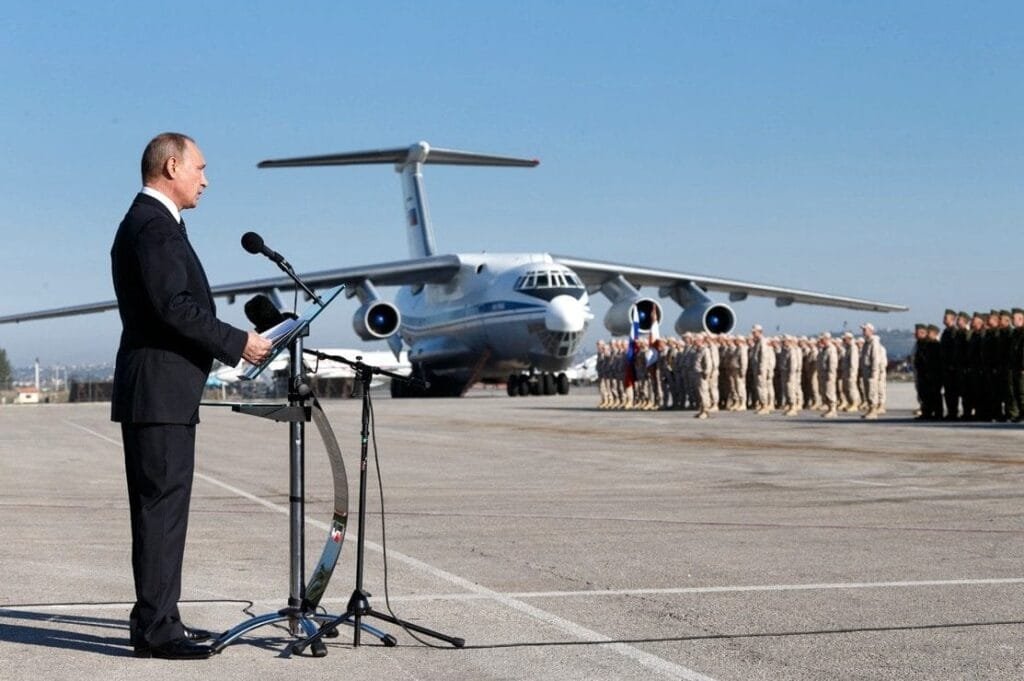Jableh, Syria – In a bold escalation of regional tensions, Israel has reportedly conducted airstrikes targeting areas exceptionally close to Russia’s Khmeimim Air Base in western Syria, near the coastal city of Jableh. This incident marks a significant moment in the ongoing conflicts involving Israel, Syria, Iran, and by extension, Russia.
According to posts on X and various reports, the strike occurred shortly after an Iranian cargo plane, believed to be operated by the sanctioned IRGC-linked Qeshm Fars Air, landed at the base. The timing suggests the attack aimed to destroy newly delivered munitions or military equipment, potentially escalating Israel’s strategy against Iranian military entrenchment in Syria.
Strategic Implications:
- Regional Security: This strike near a Russian-operated base raises questions about the implications for regional security. Hmeimim Air Base, crucial for Russia’s military operations in support of Syrian President Bashar al-Assad, has generally been considered a red line for direct confrontations. Israel’s action signifies either a calculated risk or a strategic message to both Iran and Russia.
- Israel-Russia Relations: Historically, Israel and Russia have maintained a deconfliction mechanism to avoid unintended clashes in Syrian airspace. However, recent reports indicate that Israel might no longer be informing Russia prior to its strikes, hinting at deteriorating coordination or a bolder Israeli stance against Iranian activities, regardless of Russian presence.
- Global Reaction: The international community watches closely, as this event could pivot the dynamics in Syria. While there has been no official statement from the Kremlin at the time of this report, the lack of immediate military retaliation from Russia or Syria might suggest a complex game of chess where direct confrontation is carefully avoided.
Background
- Ongoing Conflict: Israel has long conducted airstrikes in Syria targeting Hezbollah and Iranian assets, aiming to prevent the transfer of advanced weapons systems that could threaten its security. This strike, however, edges dangerously close to direct confrontation with Russian forces.
- Russian Involvement: Since its intervention in 2015, Russia has been a key player in the Syrian conflict, backing Assad’s regime. The Khmeimim base is not just a military asset but a symbol of Russian influence in the region.
Analysis:
- Military Strategy: Analysts suggest that Israel’s decision to strike so close to Russian assets might be intended to test the limits of Russian tolerance or to signal its unwavering commitment to curb Iranian influence, even at the risk of broader conflict.
- Diplomatic Fallout: This event could lead to diplomatic friction. While Russia and Israel have managed to navigate their interests in Syria thus far, this incident might force Russia to reassess its stance or lead to a more explicit alignment with Iran.
- Future Scenarios: Observers speculate whether this could lead to an isolated retaliation, a new understanding between involved parties, or an unintended escalation into wider conflict involving global powers.
As the dust settles over Khmeimim, the world waits to see if this strike will be a footnote in the annals of the Syrian conflict or a catalyst for a new phase of regional warfare. What remains clear is Israel’s resolve to act against perceived threats, even when those threats nestle under the aegis of Russian military might. The coming days will reveal whether this act was an overreach or a new norm in the volatile chessboard of Middle Eastern geopolitics.
